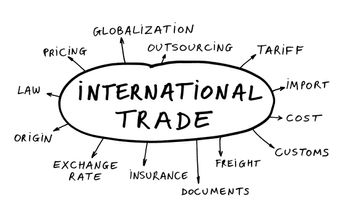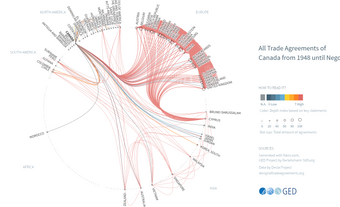International Trade
International trade theory considers the various factors which cause or determine trade. These include differences in relative factor endowments among countries, variations in tastes and/or incomes, economies of scale, changes in technology, and differences in taxation policy. All of these factors cause divergence in the relative prices of goods and services among countries and therefore stimulate exports or imports. Canada, for example, has rich endowments of many natural resources. Because of this, many of its exports are based on these endowments, either directly as with grains, meats, lumber, metals and energy products; or indirectly such as with processed metals, petrochemicals and newsprint. New technologies for exploiting natural resources and for products such as telecommunications also result in exports.
The effects of such trade on the distribution of income among the various groups in society are also examined. Those working in or owning export industries gain as the demand for their production increases, which normally raises their incomes and profits. Workers in and owners of Canadian industries competing with substantial imports, such as in clothing, textiles, furniture and many types of machinery and equipment, in turn find their incomes reduced because of international trade. Consumers generally benefit when imported goods can be purchased for lower prices than domestically produced goods.
These diverse effects lead nations to adopt a wide range of commercial policies to promote their own exports and discourage imports from other nations. The production and distribution effects of these policies form an important part of trade theory and analysis. In the last few decades, as tariffs have been generally reduced, nations have adopted a range of nontariff policies referred to as the "new protectionism." These have included export subsidies, dumping and anti-dumping policies, countervailing duties to offset export subsidies of other countries, and attempts to pressure other nations to adopt "voluntary" import expansion or export restraint policies.
Trade liberalization arrangements of various types form a part of the study of international trade as well. Canada is a member of the North American Free Trade Agreement (NAFTA) along with the US and Mexico. Canada has also negotiated separate free trade agreements with Chile and Israel and is an active participant in the ongoing discussions of Pacific Rim countries under the auspices of APEC.
International Finance
International finance and balance of payments theory focuses on the monetary aspects of international trade. It looks specifically at the huge flows of international capital (which dwarf international trade in volume) and the implications of these flows for exchange rate movements and the current account (or goods and services sector) of a nation's balance of payments. Canada, which has a long history of net international inflows, is today one of the world's largest international debtors.
International finance also examines the short- and long-term effects of monetary, fiscal and exchange rate policies on the balance of payments, as well as the relationships among these policies, the balance of payments and the levels of output, employment and prices in the domestic economies of nations. The pros and cons of differing international monetary regimes are also considered, as well as the role of the various international institutions such as the International Monetary Fund (IMF), the International Bank for Reconstruction and Development (IBRD) and the World Trade Organization (WTO), all of which Canada is an active member of. The role of multinational corporations in the international economy is also studied as such corporations assume an increasingly dominant role in the conduct of international trade, commercial policy, investment and macroeconomic policy.

 Share on Facebook
Share on Facebook Share on X
Share on X Share by Email
Share by Email Share on Google Classroom
Share on Google Classroom


